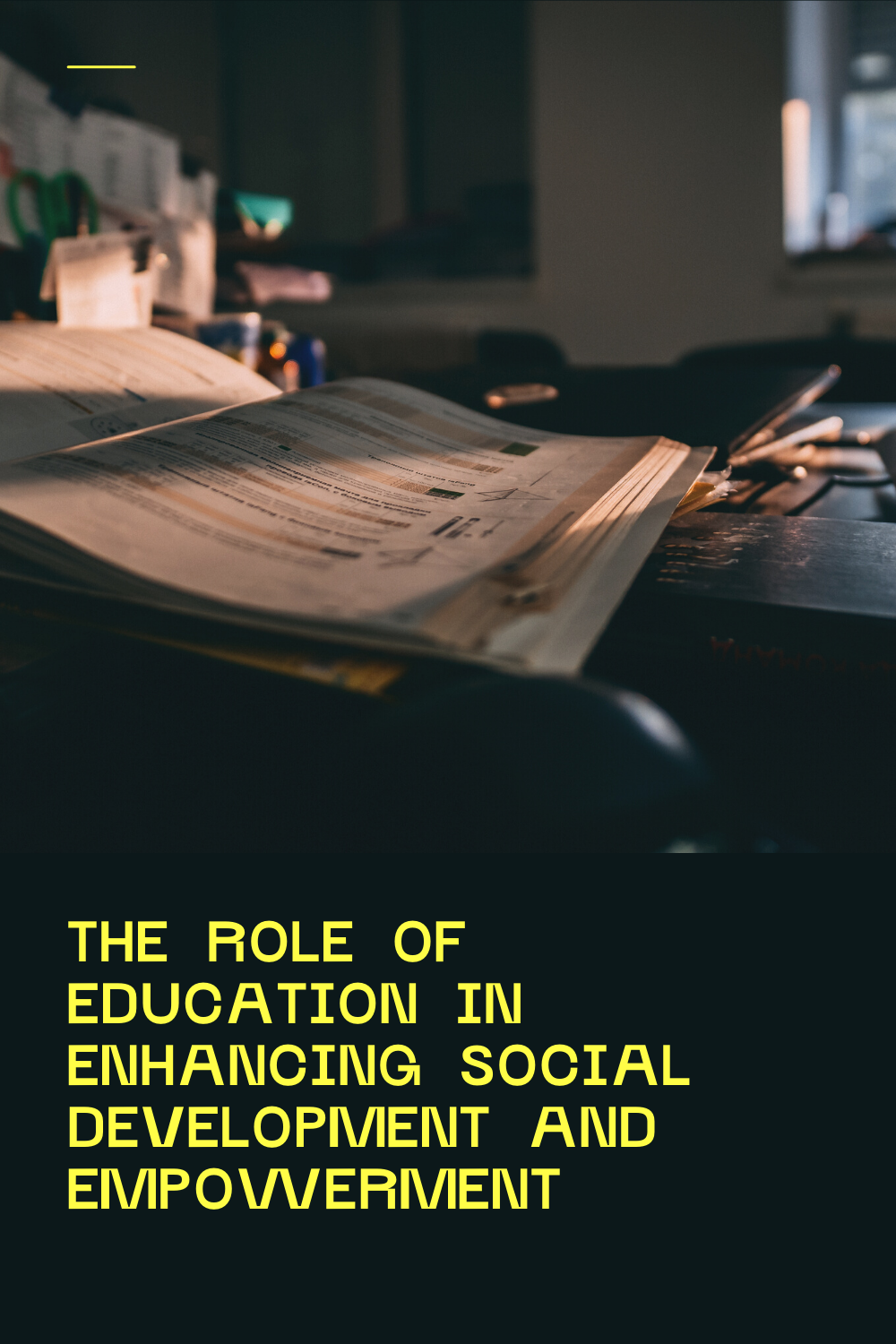Tags:


Education plays a pivotal role in fostering social development and empowerment, equipping individuals with the necessary knowledge, skills, and values to actively participate in society. It serves as a powerful means to alleviate poverty, reduce inequality, and combat discrimination. Recognizing its significance, the United Nations has included education as one of the 17 Sustainable Development Goals, with the aim of providing quality education for all, irrespective of their backgrounds, by 2030.
Social development encompasses the collective efforts to enhance the overall quality of life within a society. It encompasses initiatives to reduce poverty, improve healthcare, ensure education for all, and promote equality. By fostering a just and equitable society, social development contributes to the reduction of crime and violence, fostering peace and stability (World Bank, 2019).
Empowerment entails granting individuals the agency to take control of their own lives. It involves enhancing people’s knowledge, skills, and confidence while ensuring their inclusion in decision-making processes. Empowerment not only enables individuals to improve their own lives but also fosters stronger communities and supports democratic principles (United Nations, 2015).
Education can play a pivotal role in enhancing social development and empowerment through the following mechanisms:
Increase knowledge and skills: Education equips individuals with the necessary knowledge and skills to participate in the workforce, start businesses, and engage as active citizens. Through formal education systems, individuals gain foundational literacy and numeracy skills, as well as specialized knowledge in various fields (United Nations, 2015).
Promote critical thinking and problem-solving skills: Education nurtures critical thinking and problem-solving abilities, enabling individuals to make informed decisions and address challenges within their communities. By encouraging individuals to analyze information, evaluate arguments, and seek evidence, education empowers them to be active and engaged participants in society (World Bank, 2019).
Encourage civic engagement: Education motivates individuals to actively engage in civic life and hold leaders accountable for their actions. By fostering an understanding of democratic processes, human rights, and citizenship responsibilities, education empowers individuals to participate in community initiatives, advocate for social justice, and contribute to positive social change (United Nations, 2015).
Reduce poverty and inequality: By imparting skills and knowledge, education can help individuals secure better employment opportunities, thus reducing poverty and inequality. Education enhances individuals’ economic prospects by providing them with the skills needed for gainful employment, entrepreneurship, and economic participation (World Bank, 2019).
Promote tolerance and understanding: Education fosters tolerance and understanding by educating individuals about diverse cultures and perspectives, thereby promoting social cohesion. Through inclusive and diverse curricula, education encourages respect for differences, cultural sensitivity, and appreciation of the values and traditions of different communities (United Nations, 2015).
Several real-world examples demonstrate how education has been instrumental in promoting social development and empowerment:
India: The Indian government has launched various education programs targeting poverty reduction and gender equality. These initiatives have increased literacy rates and improved access to education for girls and women. By providing educational opportunities to marginalized communities, India has made significant strides in reducing inequality and empowering individuals (World Bank, 2019).
South Africa: Education has played a crucial role in South Africa’s journey towards racial reconciliation and inclusivity. The establishment of the Truth and Reconciliation Commission in 1995 educated citizens about apartheid’s history, fostering reconciliation. By acknowledging historical injustices and promoting understanding, education has contributed to social healing and national unity (United Nations, 2015).
United States: Education has been instrumental in the fight for social justice and combating discrimination. The educated African Americans of the Civil Rights Movement in the 1950s and 1960s made significant strides towards achieving civil rights for all. Through grassroots movements and educational initiatives, they challenged systemic racism and advocated for equal rights, leaving a lasting impact on society (World Bank, 2019).
Education stands as a powerful tool for enhancing social development and empowerment. It equips individuals with the necessary knowledge, skills, and values to actively participate in society while simultaneously addressing poverty, inequality, and discrimination.
In conclusion, education is indispensable for social development and empowerment worldwide. Its potential to transform lives and promote societal progress cannot be overstated. By prioritizing education, societies can foster an inclusive and equitable future for all. Education serves as the catalyst for personal growth, community development, and positive social change. Through educational opportunities, individuals are empowered to shape their own destinies and contribute to a more just and prosperous world.
Tharushi Imasha Kumarasiri
Sep 04, 2023
0